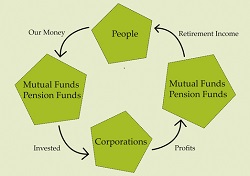|
People, Profits, & Pensions |
|
Canadian Mounties & DIRECTV
Thursday, February 20, 2014
The Mounties are the Royal Canadian Mounted Police, and along with members of the Canadian armed forces and the Canadian federal civil service are the main participants in the Public Sector Pension Investment Board (PSP). They owned 181,689 shares of this American company at the close of trading last December 31st (according to nasdaq.com). The company describes itself this way at its website,
In a news release, the company announced its fourth quarter and full year 2013 results. The highlights of the report included revenue growth of 6% and an increase of 8% in earnings per share (EPS). The market liked the news; the share price increased in morning trading, up more than 3% at one point. Almost 86% of the company's shares belong to institutional investors (mostly pension funds, mutual funds, and insurance companies). The linkages here show our perspective needs to be global when considering business and the funds that help us save for retirement. In this case, we see Canadian police officers and soldiers buying stock in an American company, which used that capital to help it expand into Latin America. In turn, those same police and soldiers will see their retirement incomes bolstered with profits DIRECTV makes in Latin America. The Bigger Picture:Will Profits from Big Macs Add to Your Retirement Income?In 1948, the McDonald brothers redesigned and remodelled their drive-in restaurant in San Bernardino, California. Taking inspiration from Henry Ford's assembly-line, they created the fast food revolution, with the quick service and low prices we now take for granted. In that same year, the U.S. National Labor Relations Board ruled unions could include pension issues in contract negotiations. That ignited a massive expansion of pension plans. In the 1950s, pension funds started buying stocks, rather than just bonds or their equivalents; in addition mutual funds came of age. With these two developments working, middle class people became owners of big business. At first, their stakes were modest, but steadily growing. And in just a few decades, they gained controlling interests in many large corporations through their funds. Management guru Peter Drucker has called it, "...one of the most startling power shifts in economic history." Now, working people reap the benefits of those investments, collecting much of the profit distributed by McDonald's and other big corporations. Discover how the pieces fit together. In Big Macs & Our Pensions: Who Gets McDonald's Profits? - a new booklet -(about 25-pages), you will:
You may not be among the owners of McDonald's. But if you belong to any pension plan, or contribute to a mutual fund or whole life insurance policy, you likely own pieces of some big corporations. More importantly, though, your retirement income will be bigger and grow more dependably than you would otherwise expect. Big Macs & Our Pensions: Who Gets McDonald's Profits? is now available at Amazon.com
|

The Ownership Cycle
Copyright 2014. Robert F. Abbott, All Rights
Reserved.
|

 By: Robert F. Abbott, author of
By: Robert F. Abbott, author of  Red coated Canadian Mounties are among the owners of DIRECTV, and no doubt enjoying this
morning's earnings' announcement (however, they won't enjoy access to DIRECTV's satellite television
services).
Red coated Canadian Mounties are among the owners of DIRECTV, and no doubt enjoying this
morning's earnings' announcement (however, they won't enjoy access to DIRECTV's satellite television
services).